Understanding Cholesterol
Last Updated : December 7, 2023
What is cholesterol?
Cholesterol refers to a group of fats found in our blood. Our body needs some cholesterol to work properly. Too much of some types of cholesterol in our blood can be dangerous. It leads to inflammation and build up of deposits/blockages in your blood vessels.
We have both good cholesterol (high-density lipoprotein or HDL) and bad cholesterol (low-density lipoprotein or LDL). It is important for your health to keep your bad cholesterol or LDL levels low.
This build-up of cholesterol:
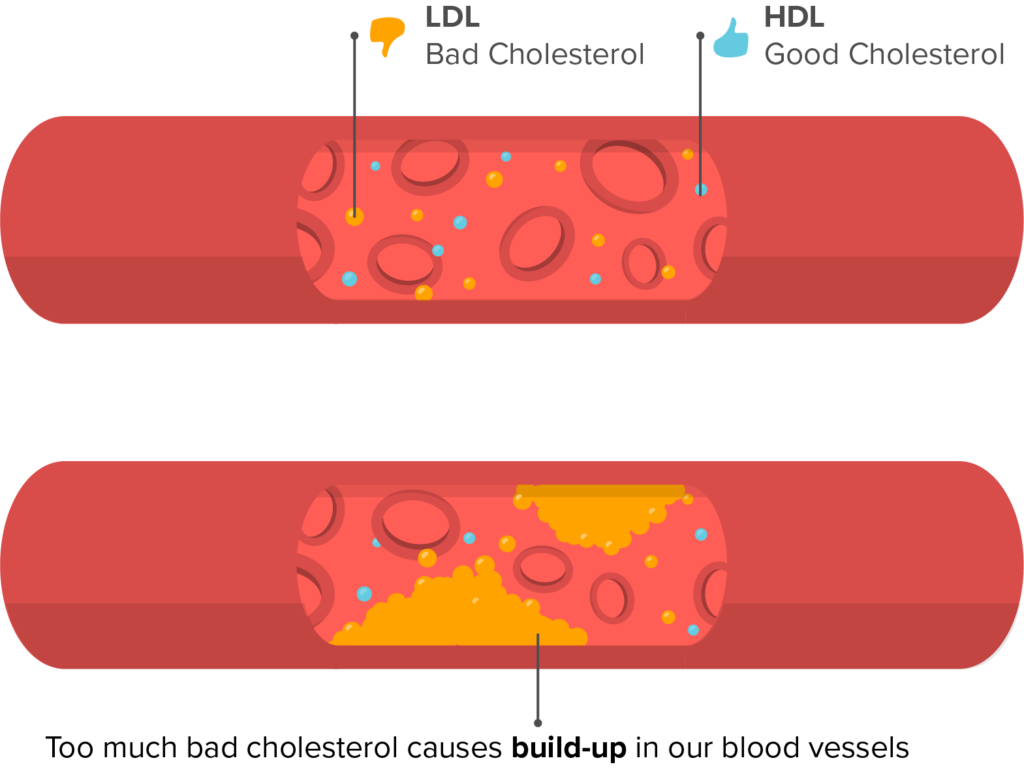
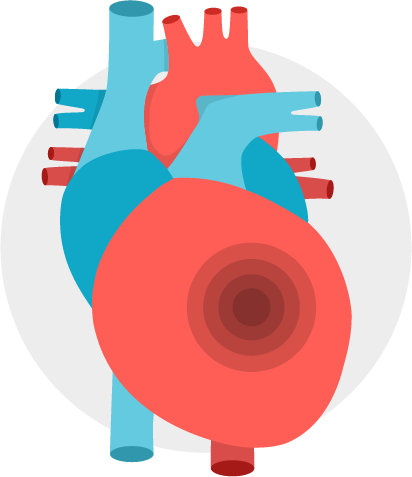
Causes heart attacks
Build-up of cholesterol leads to blockage in the blood vessels around the heart. Blockages can lead to the heart to stop working.
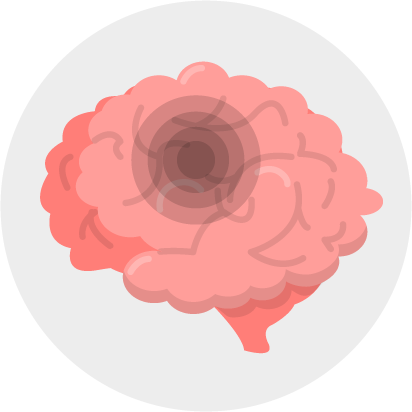
Causes strokes
Build-up of cholesterol can block blood flow to part of the brain. When blood flow is blocked, the brain cannot work properly anymore.
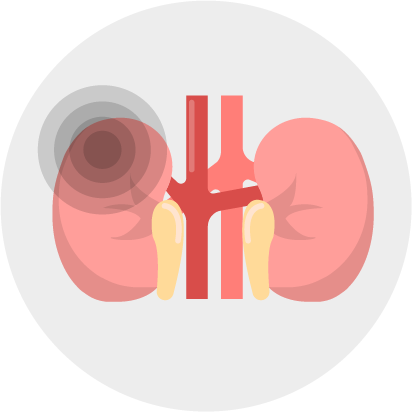
Can lead to damage in our kidneys
When the kidneys are damaged they are unable to effectively clean our blood.
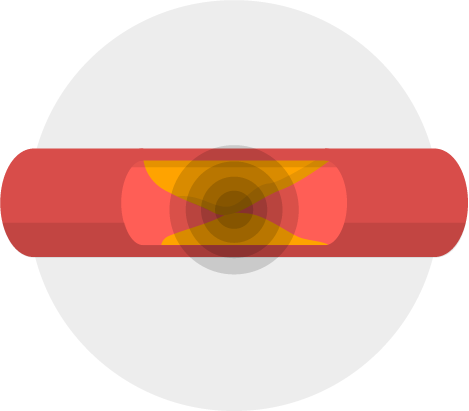
Limits blood flow through your body, like your legs, and a variety of other problems.

How common is high cholesterol and why does cholesterol matter?
About 1 in 3 adults in Canada have high cholesterol. The number of Canadians with high cholesterol goes up with age. As your cholesterol rises, so does your risk of heart attacks and strokes.
Knowing your cholesterol levels can help you and your doctor or other healthcare professional know more about your risk for heart attack and stroke.
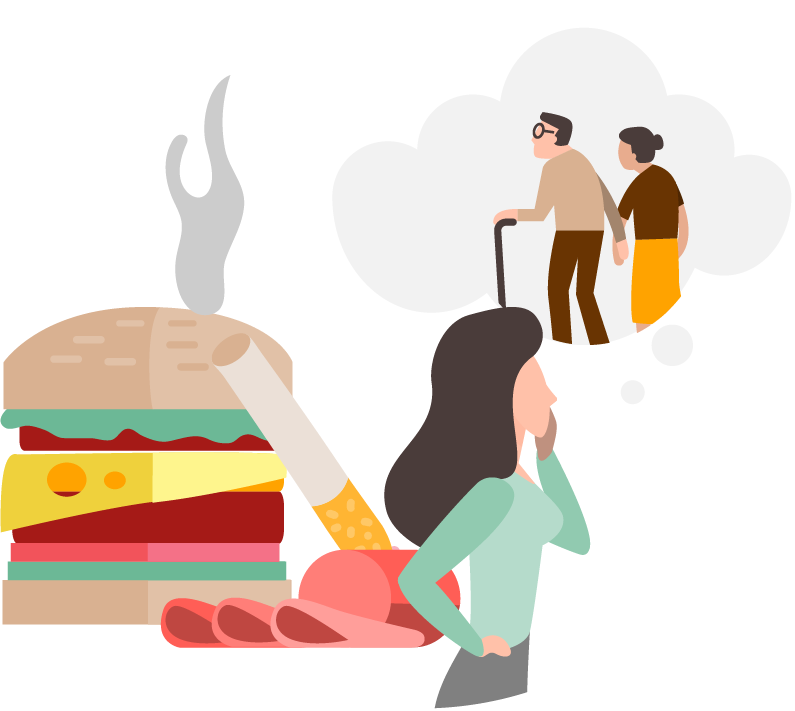
What causes high cholesterol?
There are many things that can cause high cholesterol:
• Unhealthy diet
• Higher body fat
• Low level of physical activity
• Smoking
• Age
• Family history and genetics
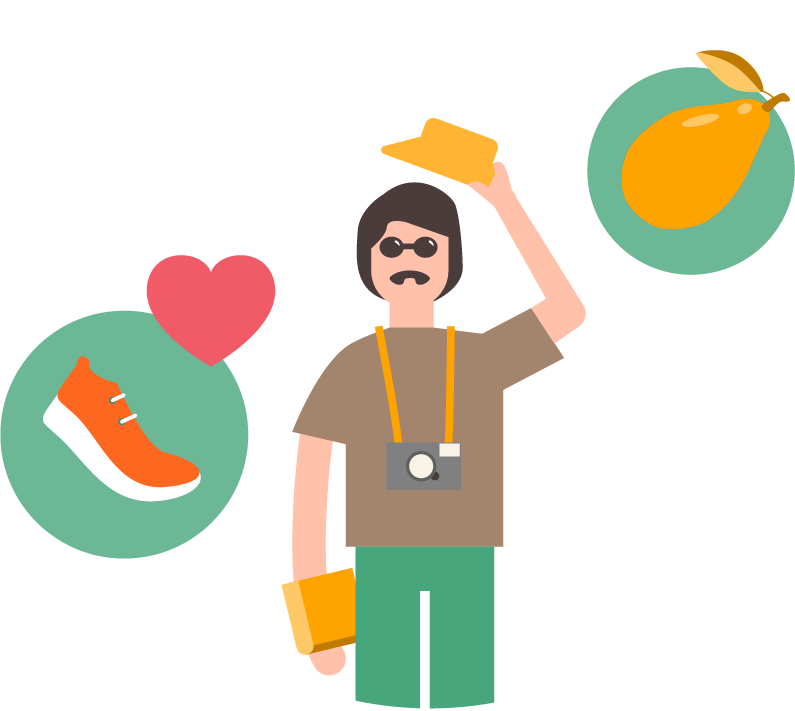
Why would I want to lower my cholesterol?
Lowering your cholesterol can lower your chance of a heart attack or stroke. And support a longer healthier life.
It is important to lower your risk for high cholesterol. You can lower your risk by making healthy lifestyle choices like:
• Exercising
• Eating healthy foods
• Not smoking
How do I know if I have high cholesterol?
Having high cholesterol does not make you feel sick or unwell. The only way to know if you have high cholesterol is to get a blood test.
After your blood test, your doctor will review your results with you. In addition, they will discuss your medical history and present health.
If you live in Alberta, you can sign up for MyHealth Alberta to see your own results.
Canadian guidelines recommend getting a blood test to assess your cholesterol levels if you are:
• 40 years or older
Specific ethnic groups, like South Asian or Indigenous Peoples, are at higher risk and should be tested earlier.
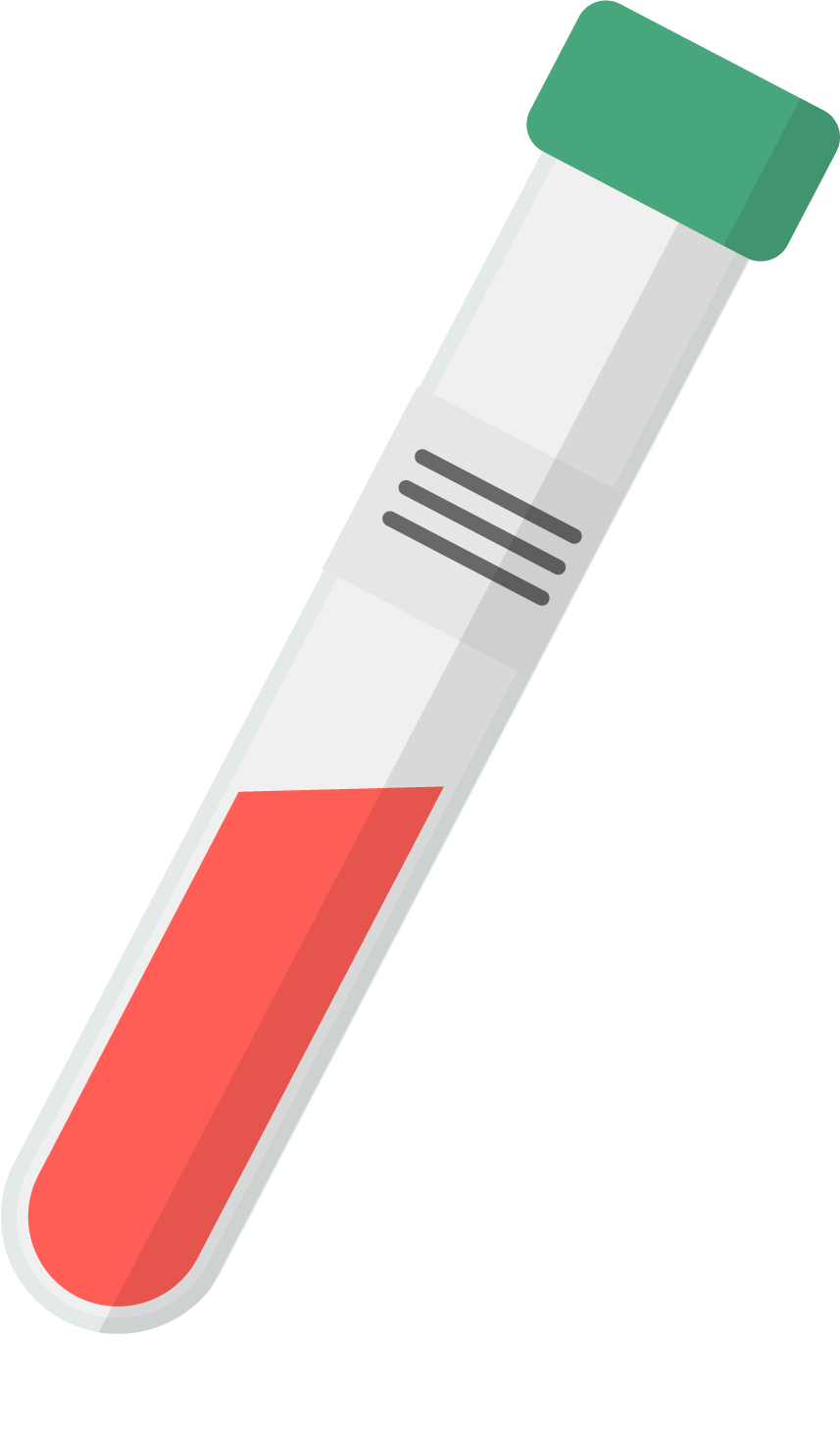
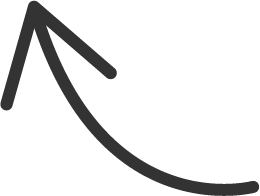
A blood test it the only way to know if you have high cholesterol
Also, people of any age if you have any of the following:
• Living with obesity
• Are a smoker
• Have smoked within the last year
Have a family history of:
• High cholesterol
• Early heart disease or stroke
For women:
• Postmenopausal
• Had high blood pressure during pregnancy
Statin indicated conditions*:
• High blood pressure
• Diabetes
• Chronic obstructive pulmonary disease (COPD)
• Cardiovascular disease (history of angina, heart attack, stroke or
peripheral vascular disease)
• Chronic kidney disease (CKD)
• Inflammatory conditions (for example: rheumatoid arthritis, lupus)
• Atherosclerosis (build up of deposits/blockage in your arteries)
• Abdominal aortic aneurysm
• Visible bumps of cholesterol under your skin (a sign of high cholesterol)
• HIV infection
• Erectile dysfunction
*Statin indicated conditions are conditions in which statin therapy is indicated regardless of the calculation by Heart Health Calculator, as they are conditions that make individuals high risk for a heart attack or stroke.
2021 CCS Dyslipidemia Guidelines
High cholesterol can affect anyone. Having a family history of high cholesterol makes it more likely for you to have high cholesterol.
Talk to your doctor
The Canadian Cardiovascular Society guidelines recommends checking your cholesterol:
- At the age of 40 years, and after that check your cholesterol every 5 years
- Or, if you have other/or develop risk factors your doctor might choose to get your cholesterol checked more often – Click here to read more about risk factors for high cholesterol
Once you start a medication or treatment, your cholesterol will likely need to be checked more often.
Talk to your doctor
Having a statin indicated condition means that you have or have had a medical condition that would benefit from statin medication. Even if your cholesterol levels are normal, a statin medication will provide you with extra protection. By taking a statin you will lower your chance of a heart attack or stroke. This is because statin medications work in more than one way. This benefit has been proven in research studies.
Talk to your doctor
How do I lower high cholesterol?
There are many things you can do that can lower your cholesterol. Having healthy lifestyle habits will help you lower your risk for heart attack and stroke. There are also medications (statins) that can help. Talking about cholesterol management with your doctor and healthcare professional will help you decide on what is best for you.
- Diet
- Exercise
- Stop smoking.
- Your personal preferences.
- What your personal targets are.
- Any concerns you have.
- And discuss what would work best for your situation.
Your target cholesterol goal is highly personal, and is based on your medical history.
Talk to your doctor to find out what your target is and how to achieve it
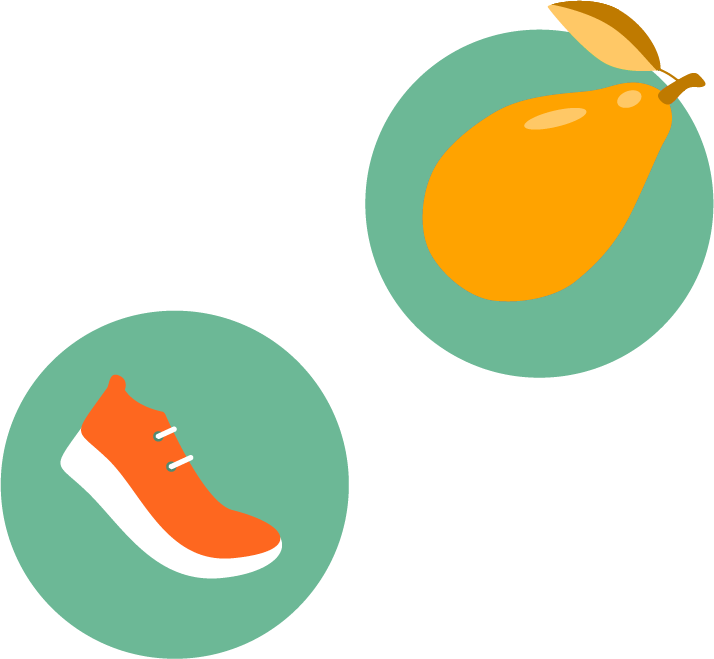
Lifestyle Factors
Your diet has a big impact on your health. Highly processed foods contain higher levels of saturated fats, salt (sodium), sugar, and often have higher calories which causes weight gain. Saturated fats also increase the bad cholesterol in your blood. Eating a healthy diet, being active, maintaining a healthy weight will help lower your risk of high cholesterol.
Lifestyle changes are an important part of reducing your cardiac risk. Lifestyle changes can help with lowering your cholesterol. What you eat and the amount of exercise you do has a huge impact on your health.
Changing old habits might not be easy, but small steps can go a long way. Such as adding one fruit or vegetable a day for a week.
Lifestyle changes are often not enough to lower our cholesterol levels. To understand what is best for you, talk to your doctor. A combined approach of lifestyle changes and a statin medicine can be helpful.
Talk to your doctor to understand if lifestyle changes would be enough for you
To lower your cholesterol you should try to avoid saturated fats. Saturated fats are commonly found in fatty meats, full-fat diary products, certain fats and oils.
You should also avoid highly processed food. Highly processed foods are a major source of saturated fat, and are usually high in calories, salt, and sugar.
Examples of processed foods are:
- Processed meats, like sausages, bologna, salami, hot dogs, liver meat pate
- Prepared foods
- Snack foods
- Chocolate and sugary drinks
If you eat a healthy and balanced diet your saturated fat intake should not be a big issue.
- Canada’s Public Health Agency recommends you to be active at least 2.5 hours a week.
- Focus on moderate and vigorous aerobic exercises in small 10-minute sessions.
Aerobic exercise is also known as cardio. It includes brisk walking, swimming, running and cycling. You can often tell you are doing aerobic exercises as your breathing and heart rate goes up.
- Try to get stronger by adding activities that target your muscles and bones at least 2 days per week like weightlifting.
Try to find something you enjoy and have easy access to. If you are unsure what exercise works for you, talk to your healthcare professional .
Talk to your care team to find exercise that works for you
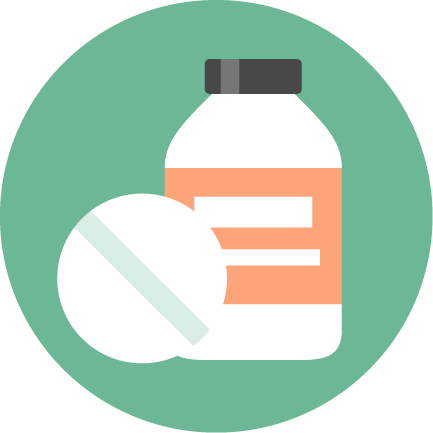
Medications
There are several medications but the most common type is statins. A statin is a type of medication that can help lower your cholesterol. Healthy lifestyle habits are very important, but sometimes they are not enough to lower your cholesterol. You can follow a healthy lifestyle and still be at risk for heart attack and stroke.
People who have had a heart attack or stroke will decrease their risk for another event by taking a statin. People living with diabetes or kidney disease are at higher risk for a heart attack or stroke. A statin is recommended to lower this risk for these people.
The dose is determined by rechecking your LDL cholesterol level. After you start a statin, your cholesterol levels should be checked again in 6 to 8 weeks.
If you are at target, your dose will stay the same. If you are not yet at target, your doctor will increase your dose of statin every 6 to 8 weeks until you are at target.
The most common statin medications cost about $10 to $12 a month plus any pharmacy fees in Alberta.
Statins are covered by medical benefits insurance providers. Should you not have private health insurance coverage, there are ways Albertans can access prescription drugs through a number of programs. Click here to learn more about some of the resources available.
Talk to your doctor to find out what resources are available to you
Medications for Cholesterol
What are statins?
Statins are a type of medicine used to lower cholesterol. Your doctor and healthcare professional might recommend a statin if you are high risk on a calculator . They may also recommend a statin if you have had a heart attack, stroke, diabetes or kidney disease. Statins have been safely used for many decades and are taken once a day.
Statins help to reduce the risk of heart attacks and strokes. Statins are always used alongside a healthy lifestyle.
How do statins work?
Cholesterol builds up in the blood vessels as “plaques” and eventually this can lead to blockages. “Statins” are a class of medications that are used to lower cholesterol levels, and thus reduce plaques from being formed. While some cholesterol comes from foods, most cholesterol is made by the liver. Statins works by reducing the amount of cholesterol made by the liver, but also helps to remove cholesterol that is already in the blood. Together, this leads to an overall decrease in cholesterol your blood stream.
Statin medications have also been found to have extra benefits that stabilize already build up plaques in the arteries. It does this by reducing inflammation within the blood vessels. This stabilizes the plaques making them less prone to break and reducing the risk of blood clot formation and blocking blood flow.
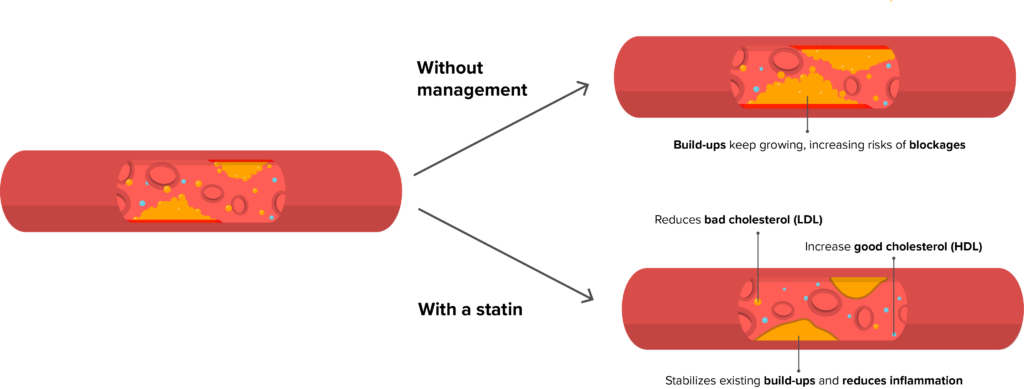
- People who have had a heart attack or stroke will reduce their risk of another event by taking a statin
- People living with diabetes or kidney disease are at higher risk of having a heart attack or stroke and taking a statin is recommended to reduce this risk
- People who have been assessed to have a high risk of having a heart attack or stroke due to their medical or family history (including high cholesterol levels)
Do statins have side effects?
You can experience side effects from any type of medication including those prescribed and non-prescription medications (natural supplements, vitamins, and purchased off a shelf at a store).
Most side effects from statins are mild and uncommon. About 5 to 10 people of every 100 who take a statin may have side effects. The most common side effect is muscle aches. This usually occurs in the large muscles like the arms or the legs. If it does happen, let your doctor or health care provider know. Muscle aches can be managed by changing to another brand of statin or lowering the dose. This side effect does not cause any long-term muscle damage. A serious type of muscle problem may occur from taking a statin. This serious muscle problem is very rare (about 1 in every 10 000 people).
Statins reduce the risk of heart attacks and strokes in people with diabetes. There could be a small increase in blood sugar levels when you take a statin. The increase occurs most often in people with prediabetes or diabetes. Statins are recommended for people with type 2 diabetes. The benefit of taking a statin to prevent a heart attack or stroke outweighs the mild increase in blood sugar levels.
The decision to take a statin is up to you. It involves looking at the benefits and possible risks. As this is a long-term treatment, it is important to talk to your doctor or health care professional about your options.
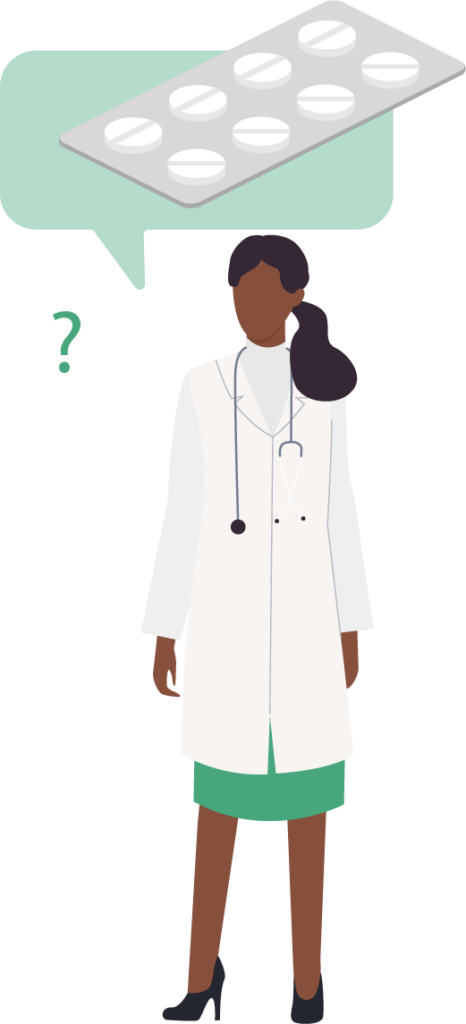
Just like any other medication, statins can interact with other medications and supplements. Always let your doctor and health care providers know all your medications, whether over the counter or prescription, as well as any natural supplements, and vitamins that you are taking.
In general, do not combine statins with grapefruit (juice). Combining grapefruit with your statin medication can increase the chance of severe side effects.
Talk to your doctor or pharmacist if you are taking other medications
Prevention is key
Prevention starts with knowing your risk. 9 in 10 Canadians have at least one risk factor for heart disease and stroke. Almost 80% of premature heart disease and strokes can be prevented through healthy behaviours. That means that habits like eating healthy, being active and not smoking, have a big impact on your health. [Canadian Heart and Stroke Foundation]
Other Questions

Cholesterol refers to a group of fats found in our blood. Our body needs some cholesterol to work properly. Too much of some types of cholesterol in our blood can be dangerous. It leads to build up in your blood vessels and inflammation.
We have both good cholesterol (high-density lipoprotein or HDL) and bad cholesterol (low-density lipoprotein or LDL). It is important for our health to keep our bad cholesterol or LDL levels low.
There are many places you can find support to make changes to your lifestyle, understand your medications, and find economic supports.
We always recommend you talk to your healthcare provider to help you find resources specifically available for you.
Ask your doctor about supports available to you
There are a variety of factors that can put you at higher risk for high cholesterol. To read more about the risk factors, click here.